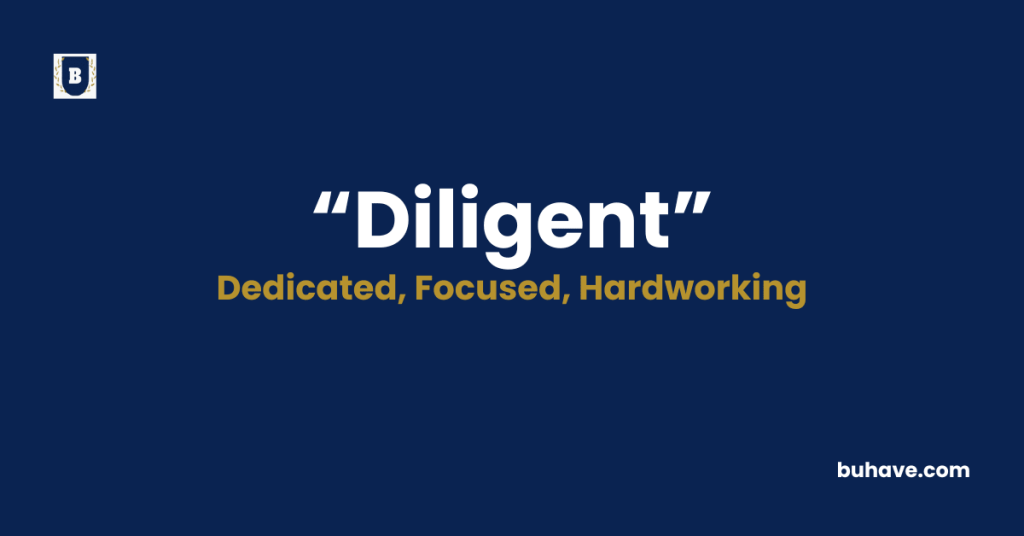The word ‘Diligent’ (Adjective) describes someone who works hard with focus, care, and determination. For example, rather than rushing through tasks. in this guide, you’ll learn the full definition, synonyms, antonyms, etymology, and real-life examples of how to use ‘Diligent’ correctly in sentences.
Diligent Explained in Depth
A complete and detailed guide to the words Diligent including meaning, definition, examples, etymology, synonyms, and antonyms.
Meanings of Diligent
Diligent means showing careful, consistent effort in everything you do. Instead of cutting corners or giving up when things get hard, a diligent person stays focused and works through each step with patience and care. Furthermore, they take pride in doing tasks thoroughly, whether the job is big or small. This kind of commitment often leads to better results, since they don’t just aim to finish—they aim to do it well.
Therefore, being diligent reflects both responsibility and a strong sense of discipline.
Definition:
Diligent describes someone who works hard with focus, care, and determination. For example, rather than rushing through tasks, a diligent person takes time to do things properly and checks their work along the way. Moreover, they stay committed, even when the task feels repetitive or difficult.
Because of their steady effort, they usually finish what they start and often produce excellent results. In short, being diligent means showing responsibility, attention to detail, and a strong work ethic day after day.
Etymology:
The word “diligent” comes from the Latin verb diligere, which means “to value highly” or “to love.” Over time, this idea of valuing something deeply evolved into the sense of putting careful and consistent effort into it. Later, Latin formed the word diligens, which described someone who showed attentive or purposeful behavior. As the language shifted into Old French, the word became diligent, keeping the idea of steady, intentional work. Eventually, English adopted it in the 14th century, and it has kept that meaning ever since. So, from its roots, the word suggests that when you care about something, you work hard at it—and that’s exactly what diligence still means today.
Example Sentences:
- Sarah reviews every report twice because she takes a diligent approach to her work.
- Although the project had many challenges, Marcus remained diligent and completed each task on time.
- The teacher noticed that Jasmine asked thoughtful questions, showing how diligent she was about understanding the material.
- Even during the holidays, the team stayed diligent, ensuring the final product met every requirement.
- Because they maintained a diligent routine, they eventually saw great progress in their fitness goals.
Diligent Synonyms:
- Hardworking
- Persistent
- Industrious
- Conscientious
- Attentive
- Thorough
- Meticulous
- Committed
- Assiduous
- Attentive
Diligent Antonyms:
- Lazy
- Negligent
- Careless
- Indifferent
- Inattentiv
- Irresponsible
- Sloppy
- Unreliable
- Idle
- Disorganized
FAQs about Diligent
Here are some Frequently Asked Questions (FAQs) about the word “diligent”
1. What does “diligent” mean?
Diligent means someone works hard and carefully. A diligent person doesn’t rush through tasks—they take their time, pay attention to details, and always try their best.
2. Is “diligent” a good quality?
Yes, it’s a very positive quality. Being diligent shows that someone is committed, responsible, and takes their work seriously.
3. What’s the difference between “diligent” and “hardworking”?
They are similar, but diligent also suggests carefulness and attention to detail. A hardworking person puts in effort, while a diligent person works hard and stays focused and thorough.
4. Can students be described as diligent?
Absolutely. A diligent student studies regularly, completes homework carefully, and doesn’t give up easily. Teachers often use this word to praise students who are focused and consistent.
5. How do you use “diligent” in a sentence?
- “She is a diligent employee who always meets deadlines.”
- “With diligent practice, he improved his piano skills.”
- “The team worked diligently to finish the project on time.”
6. Is “diligent” formal or informal?
“Diligent” is slightly more formal, so you’ll often hear it in school reports, job references, or professional settings. But it’s still easy to understand and use in everyday speech.
7. Can you be too diligent?
While being diligent is a strength, doing too much or being overly perfectionistic can lead to stress. It’s important to work hard but also take breaks and set healthy limits.

















